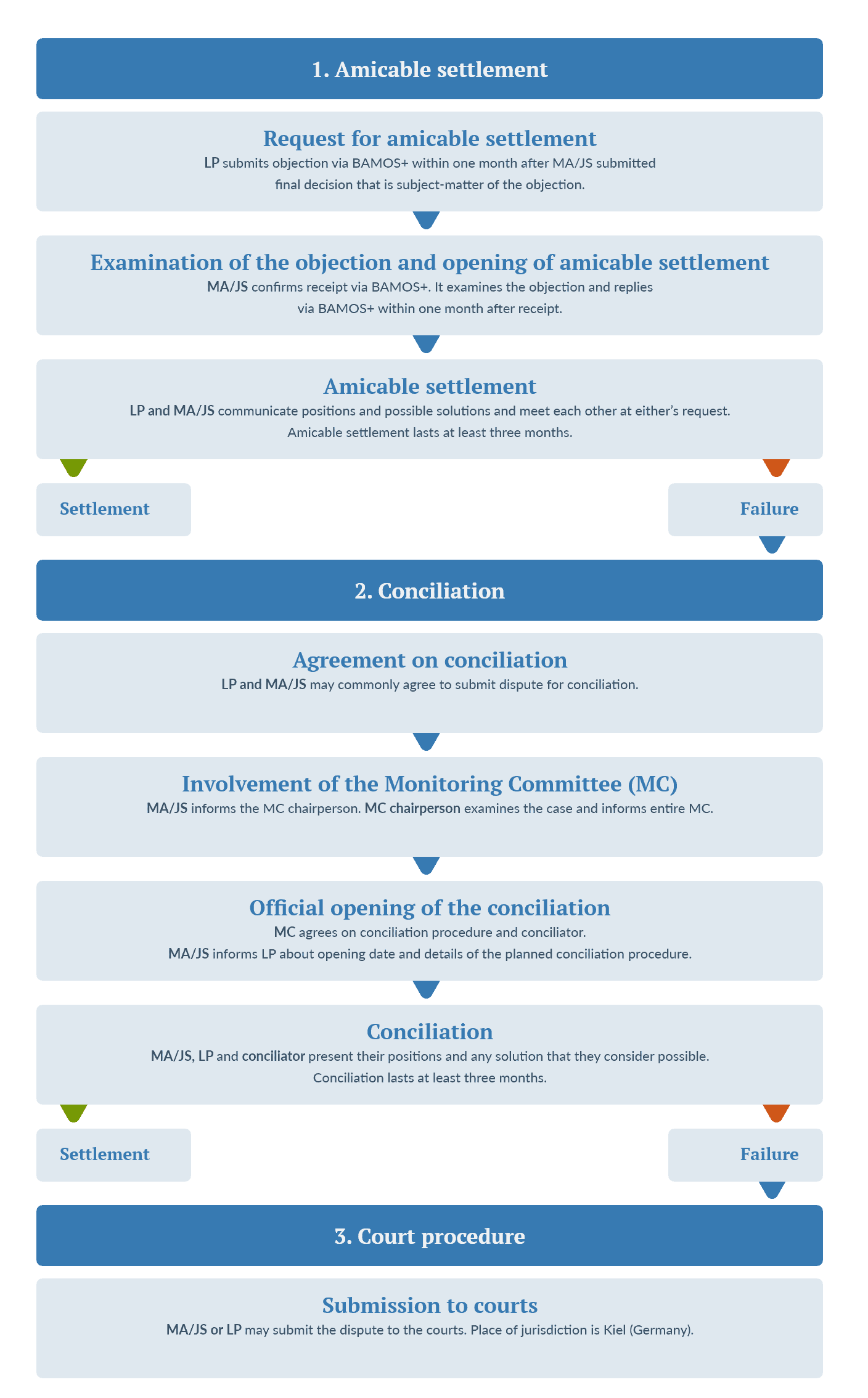During the implementation of a project, the MA/JS has to take different decisions that affect the implementation conditions of the project. For example, it has to decide whether a change in the project set-up is acceptable. Or it has to decide whether the reported expenditure subject to its checks is eligible. Not all of these decisions may be accepted by the project.
The monitoring and change procedures of the Programme are based on active communication between the MA/JS and the lead partner. This communication mainly happens via BAMOS+, but also via phone or meetings, either online or face-to-face.
In the majority of cases, the MA/JS and the lead partner agree on solutions that are acceptable for both sides. It may however happen that disputes arise that cannot be solved through the regular procedures. In such cases, the following procedure applies.
R.3.1 Right to object and formal requirements
Project partners may object to a decision made by the MA/JS that affects the implementation conditions of the project, such as the project activities or budget, or the co-financing that has been reimbursed. They may suspect mistakes during the monitoring or change process that have a negative effect on the implementation of the project. A mistake means that the MA/JS decision does not comply with the rules and/or the procedures laid down in the Programme Manual or other relevant legal documents. Moreover, technical mistakes may occur resulting in an incomplete or wrong decision.
The lead partner is entitled to file a formal objection on behalf of all project partners. The objection must contain the subject-matter, the reasons for the disagreement with the MA/JS decision, as well as solutions that the partnership considers possible. Further, the objection must include clear references to the Programme Manual and/or other applicable legal documents, e.g. the subsidy contract. The lead partner may attach supporting documents that it considers relevant.
The lead partner has to submit the objection to the MA/JS via BAMOS+ within one month after the MA/JS submitted the final decision that is the subject of the objection.
R.3.2 Handling of the objection and dispute settlement
Examination of the objection
The MA/JS confirms to the lead applicant receipt of the objection via BAMOS+.
The MA/JS examines the objection on the basis of the information brought forward by the lead partner. It may request further information from the lead partner, if the objection includes an incomplete description that does not allow the MA/JS to perform a thorough assessment of it.
Step 1: Amicable settlement
The MA/JS regards the objection as a request for an amicable settlement. The MA/JS must reply to it via BAMOS+ within one month after receipt of the objection.
During the amicable settlement, the MA/JS and the LP will do everything possible to settle the dispute. To that end, they will communicate their positions and any solution that they consider possible via BAMOS+, and meet each other at either’s request.
In case an amicable settlement is reached, the settlement decision will be final, binding to all parties and not subject to any further proceedings within the Programme if the objection is based on the same grounds.
If the MA/JS did not reply within one month, or if the attempt to reach an amicable settlement has not produced any result within three months of the objection, each party may notify the other that it considers the procedure to have failed.
Step 2: Conciliation
In the event of failure to reach an amicable agreement, the MA/JS and the lead partner may commonly agree to submit the dispute for conciliation of the Monitoring Committee or a task force of that Committee.
In this case, the MA/JS informs the MC chairperson about the subject-matter of the dispute, the process undertaken to date and the result of the amicable settlement. The MC chairperson will examine the case and inform the entire MC about further proceedings, if necessary. The information will also contain a proposal on who undertake the conciliation procedure, i.e. the entire MC, a task force or a sub-committee, and how. The MC has to decide on the proposal of the chairperson,
e.g. via written procedure.
The decision of the MC is the official opening of the conciliation procedure. The MA/JS will communicate this date and details of the planned conciliation procedure to the lead partner.
During the conciliation, the MA/JS, the lead partner and the relevant members of the MC will present their positions and any solution that they consider possible.
Where a settlement is reached, the settlement decision will be final, binding to all parties and not subject to any further proceedings within the Programme if the objection is based on the same grounds.
If no settlement is reached within three months of the opening of the conciliation procedure, the lead partner or the MA/JS may notify the other that it considers the procedure to have failed.
Step 3: Court procedure
In the event of failure of the above procedures, each party may submit the dispute to the courts. The place of jurisdiction is Kiel, Germany.
Figure 11 Dispute settlement of the Programme



